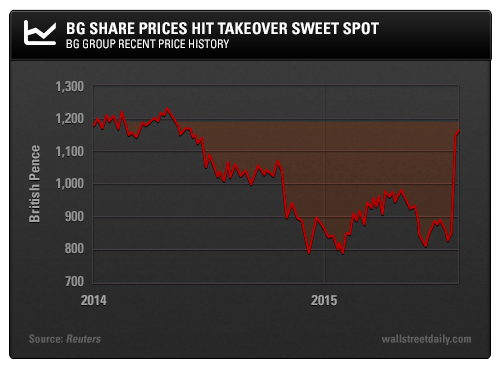Back in February, I predicted that the current crisis in oil prices would cause consolidation in the industry, with smaller companies being consumed by the energy majors.
After all, these energy giants are the only ones with deep enough pockets, valuable shares, and access to capital.
Sure enough, last week, Royal Dutch Shell (LONDON:RDSa) announced its plans to buy BG Energy (OTC:BRGYY).
But that’s just the beginning…
Shell’s move is the first shot fired in what’s sure to be an all-out merger and acquisition (M&A) war.
And while it may appear at the outset that some will overpay, companies like Shell, Exxon Mobil (NYSE:XOM) and Chevron (NYSE:CVX) have solid 20- to 30-year plans.
That means low oil prices for one or two years may prove tough initially. But it’s really just a blip in this industry that’s used to the cycles of commodity prices.
The only question now is… who’s next?
Making Allies
Shell offered a whopping 50% premium over BG’s share price close of $13.59 on April 7.
While that premium appears rich, it’s not compared to the share price from a few years ago, which traded for more than $30, and last year’s prices, which were well over $20 as recently as September 2014.

Shell paid a pretty penny, but I don’t think it overpaid, if you look ahead to the next 10 years. And I’m sure Shell will do a good job of exploiting BG’s strengths…
Shell has spent more than $56 billion in recent years bolstering its natural gas position.
It has properties all over the world, particularly in U.S. shale regions. BG not only adds to that position, but it also gives Shell something else: a solid global liquid natural gas (LNG) player.
With BG, the company will increase its LNG capacity by more than 70% over the next three years. This is something Shell has been trying to accomplish for a number of years, and with good reason…
You see, LNG is becoming more and more important to integrated majors, like Shell, as steadily rising oil prices from a year ago forced countries, particularly in Asia, to look to LNG as an alternate energy source.
Last year, Shell reported that the majority of its net income – more than $11.5 billion – was derived from LNG and related operations. Of course, low crude oil prices skewed those results heavily.
Time will reveal whether or not Shell overpaid for BG. For now, the timing looks good.
Shell was able to take advantage of lower energy prices and make a lower bid than the company would have just a few months ago. Interest rates are very low, making the cost of financing very cheap.
| Editor’s Note: As the oil majors strategize to maintain profitability, Founder Robert Williams has discovered a secret currency opportunity that predates Bitcoin. And its earnings have been off the chart! Go here for the full details. |
And as for paying a premium: That is not unusual in any acquisition, unless the company being acquired is in trouble.
By going after BG so strongly, what Shell has done, though, is fired a shot across the bow of the other majors… The message being that Shell sees long-term value in many of these companies at current prices.
Who Should You Stand With?
Unfortunately for Shell, the market doesn’t seem to agree yet, as the price of the company is still trading just off its 52-week lows.
Still, the other majors are most likely taking the message seriously. I think we’ll be seeing a lot more M&A activity soon.
If you’re looking to take positions, you may want to stay on the “A” side of things by investing in companies that may be acquired.
There are certainly a lot to choose from. But, as the Shell deal demonstrated, the big deals can bring in a lot of cash, so there’s no need to focus on small or micro caps.
At the top of my list of big targets is EOG Resources (NYSE:EOG), which is currently sporting a market cap of around $45 billion. What makes EOG so attractive is its best-in-class properties in the top shale regions, pristine balance sheet, and savvy management team.
Second, I like Australia’s Woodside Petroleum (OTC:WOPEY), a very well-capitalized LNG player that serves the Asian and European markets. Woodside shares have been hit by slumping prices and a weakened Australian dollar, making it a prime victim of a takeover from a deep-pocketed, U.S. dollar-based major.
The longer oil – and energy prices in general – remains depressed, the better the deals are going to be.
There are a lot of backroom negotiations going on right now, and cash is king!
And the chase continues,
